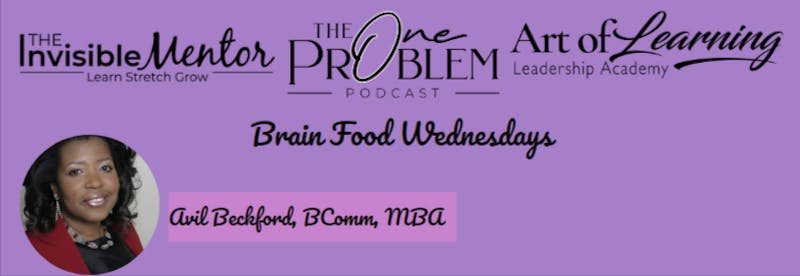Your cart is currently empty!
Brain Food Wednesday: How Good Are You at Problem Solving?

Dear Reader,
In this week’s newsletter, the 139th issue, I’m writing about how good your problem-solving skills are. In the past, have you attended conferences, bought books from speakers you loved, then promptly placed them on your bookshelf when you returned home? Or have you bought books based on recommendations from people you trust, yet they remain unread on your beautiful bookshelf, gathering dust? How many unread books are toppling over on your nightstand?
Some books contain information that could solve problems and pressing issues. How much is not reading books costing you?
I revisited work I did in 2014. Once again, I was reminded of the importance of lifelong learning and tapping into your creativity. When you’re learning continuously, you’re building your general knowledge, which will help you solve problems creatively. Marty Neumeier, wrote the book, 46 Rules of Genius.
He defines genius as:
“Anyone who turns insights into innovation and in the process changes our view of what is possible.”
Reading books will help you turn insights into innovation. Below, you’ll find the article I wrote, and I hope you find it helpful.
Ask Avil
How Good Are You at Problem-Solving?
Problem-solving skills are important for several reasons. First, they can help you better understand the world around you. Second, they can help you manage your time and resources. Third, you can make better decisions. Finally, problem-solving skills can help you communicate better with others.
Good problem-solving skills are not only useful in your personal life but also in your professional life. If you are able to effectively solve problems, you will advance in your career and earn more money. Employers often look for applicants who have strong problem-solving skills. Therefore, developing these skills can improve your job prospects and earnings potential.
For the past several years, problem-solving has been on the list of top skills the World Economic Forum says you need to thrive. Learning this one skill can and will make a difference in your life.
How would you rank yourself on your ability to problem-solve on a scale of 1 to 10? One would be you don’t have a clue how to problem-solve and 10 would be a master at problem-solving. How would someone who knows you well rank your problem-solving ability?
A simple way to become better at problem-solving is to incorporate a daily practice of getting ideas. The way to do that is to consume what Rohit Bhargava calls “brainful” media. Invest 15 minutes each day, feeding your mind with information from good books. You’ll have a pool of ideas to draw on when you face a problem. In no time, you’ll be turning insights you glean from books into innovation.
You can find 15 minutes each day. If you don’t believe me, track your time use for a month. You’ll be surprised by how much time you waste on activities that don’t take you closer to your goals.
Most people don’t practice problem-solving enough. Here are some tips to get better at it:
1. Practice regularly. Like any skill, problem-solving gets better with practice. Make a point of practicing regularly, even if it’s just for 15 minutes at a time.
2. Start with easy problems. It can be tempting to jump into the deep end and try to solve tough problems right away. But it’s often more effective to start with easier problems and gradually work up to the harder ones.
3. Break down big problems into smaller ones. When you face a big problem that overwhelms you, it can help to break it down into smaller, more manageable pieces. That way, you can focus on one part at a time and not get overwhelmed by the whole thing.
4. Be persistent.
In the MacGyver Secret there’s a 3-step process to creatively solve any problem you may have. You learn how to tap into your Inner Mac to find the best solution to your problem–you rely on yourself.
- Write the problem you have to solve. Be as specific as possible.
- Tell your Inner Mac to work on the problem for you. Set a time limit to solve the problem, then let it go. Do unrelated activities that are physical and unimaginative.
- When the time is up, ask your Inner Mac for the answer. Start writing everything that comes to you.
Join my membership site, Art of Learning Leadership Academy, at an introductory price as we build out the content on the site. Be one of the founding members.
Art of Learning Leadership Academy Membership Site
Until Next Week,
Avil Beckford, Founder, The Invisible Mentor